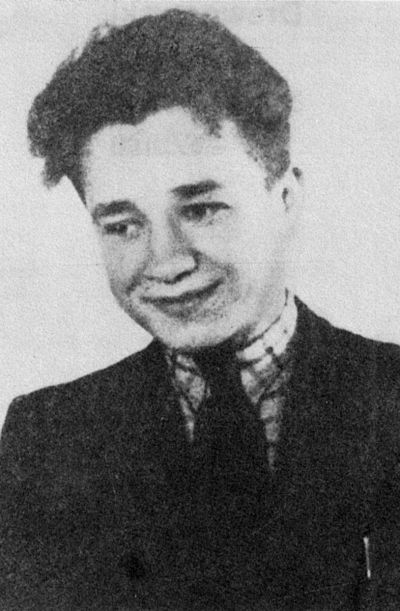“I was in a concentration camp”: Zbigniew Muszyński

Zbigniew was born on August the 13th (in some documents the date shown is September) 1926 in Jaworówka (many documents give this as Chorostów) near Włodzimierz Wołyński in a wealthy, landowning family. His father, Marcel, ran a food wholesale business in Włodzimierz. Emilia, his mother, came from the noble, rich family of Rogucki. They possessed property, including the orchard (Spasczyzna, Chorostów). He had an older brother, Leopold, and three Sisters, two older (Irena and Janina), one younger-Teresa.
Before World War II, the wife of a Russian colonel, who fled from the Bolsheviks, lived in their home. From her, Zbigniew learned Russian. His mother took care of three homeless, orphaned boys (surname Dubiel). This meant that she looked after eight children.
When Poland was under Russian rule, Emilia worked in the office at a Russian prison. Sometimes, she forwarded letters to and from prisoners. After the outbreak of the October revolution, the NKVD wanted to shoot Emilia. She was saved by her Russian friend who, rescued her from being put against the wall of death and shot (Emilia had forwarded her correspondence).
As the war rolled back and forth across Zbigniew’s home, the area was, in turn, controlled by the Poles, the Russians and the Germans. The young Zbigniew attended three primary schools and a gymnasium. A Polish school between 1933 and 1939, a Russian school from 1939 to 1941 and German school from 1941 to 1944. As a result, he was fluent in three languages, Polish, Russian and German.
After the invasion of Poland by Soviet Russia on the 17th of September 1939, some of the Ukrainians from Volyn (Wołyń) put on red bands and created the communist police. Later in the September campaign, the Polish army ousted the Soviets and reoccupied the Bieliński Forest, taking with them the Ukrainian communists.
The families of the Ukrainian prisoners pleaded with Zbigniew’s father, Marcel, to rescue their fathers and sons. Marcel went to the woods and pleaded with the Polish commanders to release the Ukrainians. He then led them from the woods to Vladimir (Włodzimierz). This was probably what later saved the Muszyński family from the exile to Siberia.
After the Soviets recaptured Volyn, the Muszyński family were warned that they were on the list of people to be exiled to Siberia. One night the Soviets came to their home and gave a woman with children, who lived in their home, half an hour to pack up. Desperate, the woman cried and screamed. Not being able to think logically, she did not pack things that could be useful later. The next day, Zbigniew’s mother, Emilia, sent Zbigniew with shoes for these children, who were in railway carriages destined for Siberia.
After that, Emilia prepared a bundle for each of the eight children whom she nursed. Their luggage lay, ready to take, next to their beds. The children knew that, if the Soviets came, to take their bundle with them. Happily though, the Muszyński family was not exiled.
In 1941, Germany invaded Soviet Russia. Zbigniew’s family home in Włodzimierz Wołyński on Topolowa str. no 21 was hit by an artillery shell. Though the upper floor was partially damaged, they still lived in it. They had a shelter in the basement. On the captured Polish lands, the Germans formed the state of Ukraine.
In the Bielin forrest about 10,000 Polish partisans were stationed. Later these became Underground Home Army soldiers. They began to form the army on the estate of Zbigniew’s family in Spasczyzna. Formation of the army was assisted by the arrival of Polish Special Forces personnel from the UK. Then, the headquarters was transferred to Bielin and forces stationed in the forests of Bielin and Kowel. Zbigniew’s brother Leopold was a partisan.
Since 1941, 15-year-old Zbigniew had worked with Polish partisans as a link between the city and the partisan groups. On horseback, he passed important information. He also ferried weapons from a nearby barracks to the partisans on a horse cart, buried under dung. He used the pseudonym 'Pirat'. One day he brought shoes to cadet Tadeusz Turzyniecki (brother of his sister’s husband) in the village of Anusin. The next day Tadeusz was killed.
He witnessed the 'carnage of Volyn '. From his family, 16 people were murdered. He saw Polish villages going up in flames. The Muszyński family were protected from attacks by Ukrainian neighbours by a machine gun placed in the window on the second floor of their home.
The abandoned barracks of the Polish Army-Artillery division, near the Zbigniew’s house at Topolowa str, was full of ammunition. There were about 20 cannons in his orchard. The Russians and Germans did not touch the ammunition, because they feared that it was mined. But, the Polish partisans used it. More than once Zbigniew ferried ammunition on his horse cart, under dung, to the Bielinski forest for the soldiers.
There, the boys from Vladimir learnt how to shoot, usually at birds. One day, Zbigniew fired a canon he was toying with. The projectile fell near his aunt’s house, luckily nobody was killed and nothing was damaged.















